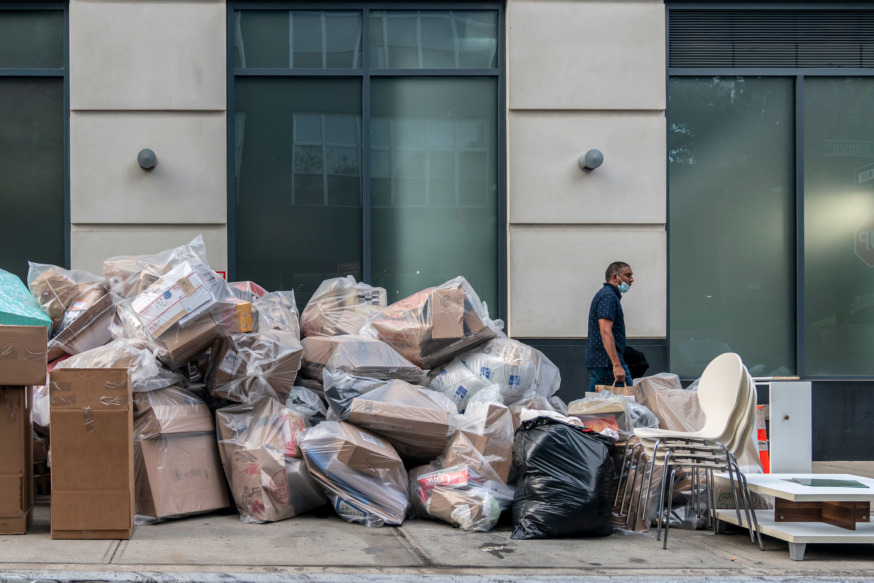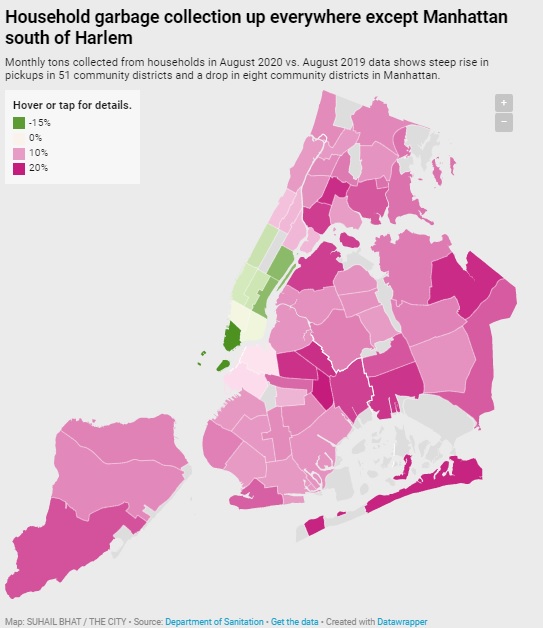
Piles of trash and tossed out furniture line a street in Clinton Hill, Brooklyn, Sept. 25, 2020. | Hiram Alejandro Durán/THE CITY
By Suhail Bhat, THE CITY
This story was originally published on 9/27/20 by THE CITY
While some essential workers are getting a respite from intense demands posed by COVID-19, city Department of Sanitation employees are hauling record-busting volumes of garbage as more New Yorkers work and go to school from home.
Residents, meanwhile, are complaining of missed pickups — a pattern Sanitation officials say is a product of pandemic-response truck schedules, not service cutbacks.
In 2020 through August, the department collected 4.2 percent more household garbage, recycling and organic waste than last year — with every borough except Manhattan driving the spike.
As THE CITY reported this spring, numerous Manhattan neighborhoods saw trash tons picked up decline in March and April, a sign many residents had fled the borough. That drop continues.
The latest Manhattan numbers show a near 3 percent decline in garbage, recycling and organic waste collections in August — with every community district south of Harlem down this year over last.
But everywhere else, New Yorkers staying home are producing more solid waste and Sanitation workers — many of them recovering from COVID themselves — have scrambled to keep up with the surge.
While Manhattan saw a decline of 6.5 percent for all of this year through August, trash collected increased 5 percent in Brooklyn, 7 percent in The Bronx and Queens and 8 percent in Staten Island.
Tons of garbage, recycling and organic waste collected citywide in August is up by 11 percent compared to the same month last year. The July haul was 9 percent bigger than last year’s.
In each of the three months through August, the city collected more tons of trash and recycling than in any other month since 2005.
‘Unconscionable’ Service Cuts
The marked increase coincides with spending cutbacks that have depleted Sanitation’s budget by $106 million, helping drive the attrition of nearly 400 positions.
Sanitation Commissioner Kathryn Garcia, who recently stepped down to explore a run for mayor, decried an “unconscionable” reduction of “basic Sanitation services” in her resignation letter.
Acting Sanitation Commissioner Edward Brayson said his department is monitoring shifts in demand among 59 community districts and is prepared to divert trucks and crews to areas in need.
“We watch the trend analysis here constantly, we know where there is more refuse being put out and If we need to run additional trucks to meet the service requirements for the district,” Brayson said.
The department cancelled separated organic-waste collection that was available to some city residents and targeted a reduction of 490 staffers in the annual city budget that began July 1.
The acting commissioner acknowledges he doesn’t have “much bandwidth” to redeploy workers to piles of garbage as collections grow in most of the city.
“Do I think the department with less workers will be less nimble? I would say yes,” said Brayson.
“But the department hasn’t missed a day of work. We came to work every single day even when we had a high rate of people confirmed with COVID-19.”
He added: “It’s our job. We’re not looking for a pat on the back.”
Surge in Complaints
As Sanitation stretches to meet increased demand with fewer bodies, residents have been complaining that trucks are skipping scheduled pickups.
Citywide, the number of “missed collection” Sanitation complaints to the 311 service line rose by about 50 percent to 5,244 in August from the same period a year earlier, according to data obtained by THE CITY from the Mayor’s Office of Analytics. The majority of those complaints came from Brooklyn and Queens.
Anecdotal complaints have continued into this month. On Sept. 10, State Sen. Julia Salazar (D-Brooklyn), who lives in Cypress Hills, tweeted that her block hadn’t seen a pickup for a week, leading to foul conditions. She suggested that her largely low-income and mostly Black and Latino neighborhood was being deprived of service.
It’s now been a full week since @NYCSanitation has picked up any of the household trash or recycling on our street. It’s piled up to point where the whole block smells foul, all because our regular pickup day was Monday (a holiday). Do you treat everyone this way or just East NY?
— Julia Salazar (@JuliaCarmel__) September 10, 2020
THE CITY heard a similar report from Williamsburg, Brooklyn. “The trash pickup was missed as recently as last week. They used to miss trash collection before the pandemic but it wasn’t as frequent as it is now,” said Sunny Ng, a software engineer who lives in the neighborhood.
When trash doesn’t get picked up, Ng said, “it gets pretty bad as people who walk up in the neighborhood will add trash to the pile and so it is left there like that. But if it opens up, the trash will be falling onto the sidewalk.”
Belinda Mager, Sanitation spokesperson, said that delays in trash pickup are expected after public holidays such as Labor Day, which was on Sept. 7.
“This impacts our refuse and recycling collection for the rest of the week,” she said. As for Salazar’s tweet, she said: “The inference that we treat some neighborhoods differently than others is just baseless and without merit.”

Hiram Alejandro Durán/THE CITY Piles of trash line a street in downtown Brooklyn, Sept. 25, 2020
One possible explanation for the growth in complaint calls is that the Department of Sanitation has altered the timing of garbage pickups as a precautionary measure against the coronavirus, according to Brayson.
The department started to collect trash after midnight and early in the morning so that the workers don’t come into as much contact with the public.
Brayson conceded there’s “a higher chance of one of the residents missing the opportunity to put [waste cans] out before midnight. And then just because of sheer timing, they also didn’t put it out after our truck had already serviced that line.”
He added: “They are isolated cases.”
Workers on the Edge
More budget cuts could be coming as New York City stares down a multi-billion-dollar budget hole.
The union representing what are now about 6,100 uniformed Sanitation workers is resisting any further personnel cutbacks.
“The city needs sanitation workers because everyone wants to go back to normal. Business leaders want to see the city clean and who will clean it, it is the sanitation workers,” said Harry Nespoli, president of the sanitation workers’ union Teamsters Local 831.
He invoked the toll the coronavirus took on his members. About 550 have been infected by the virus, while eight have died.
“During the pandemic, we went house to house collecting trash and they never missed a day risking their lives. My people were getting sick, going home and putting their families lives in danger and now they are threatened with layoffs,” Nespoli said.
‘The city needs sanitation workers because everyone wants to go back to normal.’
New Yorkers thanked these sanitation workers for picking up their trash despite scary jumps in COVID-19 cases in March and April.
Moneesha Martin, who lives in and manages a five-story building in Harlem, is among the New Yorkers grateful for sanitation workers for forging on despite frightening jumps in COVID-19 cases in March and April.
“I actually put a sign out there one day to thank them, because they were still coming through, picking up trash,” Martin said.
THE CITY is an independent, nonprofit news outlet dedicated to hard-hitting reporting that serves the people of New York.

